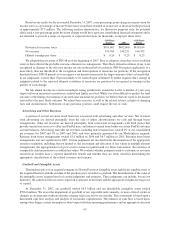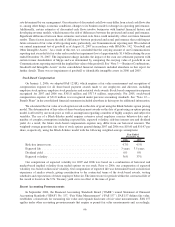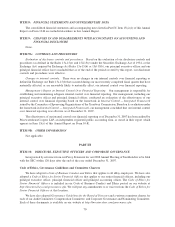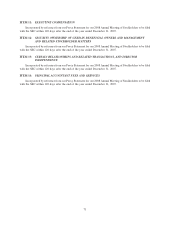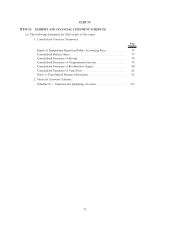eBay 2007 Annual Report Download - page 79
Download and view the complete annual report
Please find page 79 of the 2007 eBay annual report below. You can navigate through the pages in the report by either clicking on the pages listed below, or by using the keyword search tool below to find specific information within the annual report.Economic Exposure
We transact business in various foreign currencies and have significant international revenues as well as costs
denominated in foreign currencies, subjecting us to foreign currency risk. In addition, we charge our international
subsidiaries on a monthly basis for their use of intellectual property and technology and for certain corporate
services provided by eBay and by PayPal. These charges are denominated in Euros and these forecasted inter-
company transactions represent a foreign currency cash flow exposure. We purchase foreign exchange contracts,
generally with maturities of 12 months or less, to reduce the volatility of cash flows primarily related to forecasted
revenue and intercompany transactions denominated in certain foreign currencies. The objective of the foreign
exchange contracts is to better ensure that the U.S. dollar-equivalent cash flows are not adversely affected by
changes in the U.S. dollar/foreign currency exchange rate. Pursuant to Financial Accounting Standards No. 133
“Accounting for Derivative Instruments and Hedging Activities” (“FAS 133”), we expect the hedge of certain of
these forecasted transactions to be highly effective in offsetting potential changes in cash flows attributed to a
change in the U.S. dollar/foreign currency exchange rate. Accordingly, the effective portion of the derivative’s gain
or loss is initially reported as a component of accumulated other comprehensive income (loss) and subsequently
reclassified into the financial statements line item in which the hedged item is recorded in the same period the
forecasted transaction affects earnings.
During the years ended December 31, 2007, 2006 and 2005, the realized gains and losses related to these
hedges were not significant. The notional amount of our economic hedges receiving hedge accounting treatment
was $515.7 million and $203.0 million as of December 31, 2007 and 2005, respectively. The loss, net of gains,
recorded to accumulated other comprehensive income as of December 31, 2007 and 2005 was not significant. We
did not have any economic hedges in place as of December 31, 2006.
Translation Exposure
As our international operations grow, fluctuations in the foreign currencies create volatility in our reported
results of operations because we are required to consolidate the results of operations of our foreign currency
denominated subsidiaries. We may decide to purchase foreign exchange contracts or other instruments to offset the
earnings impact of currency fluctuations. Such contracts will be marked-to-market on a monthly basis and any
unrealized gain or loss will be recorded in interest and other income, net.
Foreign exchange rate fluctuations may adversely impact our financial position as the assets and liabilities of
our foreign operations are translated into U.S. dollars in preparing our consolidated balance sheet. The effect of
foreign exchange rate fluctuations on our consolidated financial position for the year ended December 31, 2007,
was a net translation gain of approximately $645.2 million. This gain is recognized as an adjustment to
stockholders’ equity through accumulated other comprehensive income. Additionally, foreign exchange rate
fluctuations may adversely impact our operating results as the revenues and expenses of our foreign operations
are translated into U.S. dollars in preparing our consolidated statement of income. The effect of foreign exchange
rate fluctuations positively impacted our consolidated net revenues and operating income for the year ended
December 31, 2007 by approximately $276.2 million and $145.7 million, respectively, compared to the prior year.
We consolidate the earnings of our international subsidiaries by converting them into U.S. dollars in
accordance with SFAS No. 52 “Foreign Currency Translation” (“FAS 52”). Such earnings will fluctuate when
there is a change in foreign currency exchange rates. We enter into transactions to hedge portions of our foreign
currency denominated earnings translation exposure using either exchange contracts or other instruments. All
contracts that hedge translation exposure mature ratably over the quarter in which they are executed. During the
year ended December 31, 2007, the realized gains and losses related to these hedges were not significant.
A hypothetical uniform 10% strengthening or weakening in the value of the U.S. dollar relative to the Euro,
British pound and Korean won in which our revenues and profits are denominated would result in a decrease/
increase to operating income of approximately $13.7 million. There are inherent limitations in the sensitivity
analysis presented, due primarily to the assumption that foreign exchange rate movements are linear and
instantaneous. As a result, the analysis is unable to reflect the potential effects of more complex market changes
that could arise, which may positively or negatively affect income.
69








